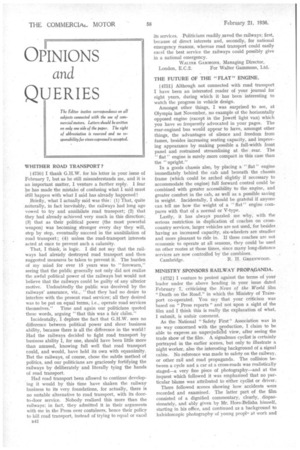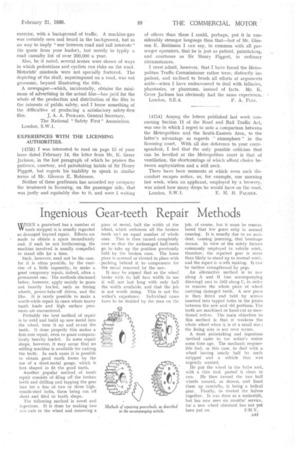OPINIONS and QUERIES
Page 56

Page 57

If you've noticed an error in this article please click here to report it so we can fix it.
The Editor invites correspondence on all subjects connected with the use of commercial motors. Letters should be written on only one side of the paper. The right of abbreviation is reserved and no responsibility for views expressed is accepted.
WHITHER ROAD TRANSPORT?
[4750] I thank G.H.W. for his letter in your issue of February 7, but as he still misunderstands me, and it is an important matter, I venture a further reply. I fear he has made the mistake of confusing what I said must kill happen with what I said has already happened!
Briefly, what I actually said was this: (l) That, quite naturally, in fact inevitably, the railways had long ago vowed to try and annihilate road transport; (2) that they had already achieved very much in this direction; (3) that as their political power (the most powerful weapon) was becoming stronger every day they will, step by step, eventually succeed in the annihilation of road transport; (4) unless the road-transport interests acted at once to prevent such a calamity.
That, I think, is logic. I did not say that the railways had already destroyed road :transport and then suggested measures be taken to prevent it. The burden of my mind for over 15 years was to "forewarn," seeing that the public generally not only did not realize the awful political power of the railways but would not believe that the railways could be guilty of any ulterior motive. Undoubtedly the public was deceived by the railways' assurance, viz., "that they had no desire to interfere with the present road services; all they desired was to be put on equal terms, i.e., operate road services themselves." Time and again our politicians quoted these words, arguing "that this was a fair claim."
Incidentally, I deplore the fact that G.H.W. sees no difference between political power and sheer business ability, because there is all the difference in the world ! Had the railways decided to fight road transport by business ability I, for one, should have been little more than amused, knowing full well that road transport could, and would, have held its own with equanimity. But the railways, of course, chose the subtle method of politics, and our politicians are graciously fortifying the railways by deliberately and literally tying the hands of road transport.
Had road transport been allowed to continue developing it would by this time have shaken the railway business to its very foundations, for actually, there is no suitable alternative to road transport, with its doorto-door service. Nobody realized this more than the railways; in fact, they admitted it in their arguments with me in the Press over containers, hence their policy to kill road transport, instead of trying to equal or excel its services. Politicians readily,saved the railways; first, because of direct interests and, secondly, for national emergency reasons, whereas road transport could easily excel the best service the railways could possibly give in a national emergency.
WALTER GAMMONS, Managing Director, London, E.C.2. For Walter Gammons, Ltd.
THE FUTURE OF THE "FLAT" ENGINE.
[4751] Although not connected with road transport I have been an interested reader of your journal for eight years, during which it has been interesting to watch the progress in vehicle design.
Amongst other things, I was surprised to see, at Olympia last November, no example of the horizontally opposed engine (except in the jowed light van) which you have so frequently advocated in your pages. The rear-engined bus would appear to have, amongst other things, the advantages of silence and freedom from fumes, besides increasing seating capacity, and improving appearance by making possible a full-width front panel and restrained streamlining at the rear. The " flat" engine is surely more compact in this case than the "upright."
In a goods chassis also, by placing a " flat " engine immediately behind the cab and beneath the chassis frame (which could be arched slightly if necessary to accommodate the engine) full forward control could be combined with greater accessibility to the engine, and greater comfort in the cab, as well as a possible saving in weight. Incidentally, I should be grateful if anyone can tell me how the weight of a "fiat" engine compares with that of a normal or V-type.
Lastly, it has always puzzled me why, with the serious restriction in duplication of coaches on crosscountry services, larger vehicles are not used, for besides having an increased capacity, six-wheelers are steadier and more pleasant to ride in. If these coaches are not economic to operate at all seasons, they could be used on other routes at those times, since many long-distance services are now controlled by the combines.
Cambridge. R. H. GREENWOOD.
MINISTRY SPONSORS RAILWAY PROPA,GANDA.
[4752] I venture to protest against the terms of your leader under the above heading in your issue dated February 7, criticizing the News of the World film "Death on the Road." in which the Ministry of Transport co-operated. You say that your criticism was based on "Press reports" and not upon a sight of the film and I think this is really the explanation of what, I submit, is unfair comment.
As the National "Safety First" Association was in no way concerned with the voduction, I claim to be able to express an unprejudiced view, after seeing the trade show of the film. A signalman cyclist is certainly portrayed in the earlier scenes, but only to illustrate a night worker, also the interesting background of a signal cabin. No reference was made to safety on the railway, or other rail and road propaganda. The collision between a cycle and a car at a cross-roads was realistically staged—a very fine piece of photography—and at the inquest which followed it was emphasized that no particular blame was attributed to either cyclist or driver.,
There followed scenes showing how accidents were recorded and examined. The latter part of the film consisted of a dignified commentary, clearly, dispassionately, and ably given by Mr. Hare-Belisha himself, starting in his office, and continued as a background to kaleidoscopic photography of young peopl° at work and exercise, with a background of traffic. A machine-gun was certainly seen and heard in the background, but in no way to imply "war between road and rail interests " (to quote from your leader), but merely to typify a road casualty list of over 200,000 a year.
Also, be it noted, several scenes were shown of ways in which pedestrians and cyclists run risks on the road. Motorists' misdeeds were not specially featured. The depicting of the skull, superimposed on a road, was not gruesome, beyond illustrating the title.
A newspaper—which, incidentally, obtains the minimum of advertising in the actual film—has paid for the whole of the production and distribution of the film in the interests of public safety, and I know something of the difficulties of producing a satisfactory safety-first film, J. A. A. PICKARD, General Secretary, The National "Safety First" Association. London, S.W.1.
EXPERIENCES WITH THE LICENSING AUTHORITIES.
[41531 I was interested to read on page 15 of your issue dated February 14, the letter from Mr. K. Greer Jackson, in the last paragraph of which he praises the patience, courtesy, and painstaking habits of Sir Henry Piggott, but regrets his inability to speak in similar terms of Mr, Gleeson E. Robinson.
Neither of these gentlemen has accorded my company the treatment in licensing, on the passenger side, that was justly and equitably due to it, and were I writing
of others than these I could, perhaps, put it in considerably stronger language than that—but of Mr. Gleeson E. Robinson I can say, in common with all passenger operators, that he is just as patient, painstaking, and courteous as Sir Henry Piggott, in Ordinary circumstances.
I must admit, however, that I have found the Metropolitan Traffic Commissioner rather terse, distinctly impatient, and inclined to brush all efforts at arguments aside--when I have endeavoured to deal with fallacies, phantasies, or phantoms, instead of facts. Mr. K. Greer Jackson has obviously had the same experience.
London, S.E.1 F. A. FUN,.
[4754] Among the letters published last week concerning Section 11 of the Road and Rail Traffic Act, was one in which I regret to note a comparison between the Metropolitan and the South-Eastern Area, to the latter's advantage as regards "atmosphere" in the licensing court. With all due deference to your correspondent, I feel that the only possible criticism that can be levelled at the Metropolitan court is that of ventilation, the shortcomings of which afford choice between asphyxiation and a stiff neck.
There have been moments at which even such discomfort escapes notice, as, for example, one morning last week, when an applicant, employed by a brewery, was asked how many drops he would have on the road.
London, S.W.1. E. H. B. PALMER.




























































































